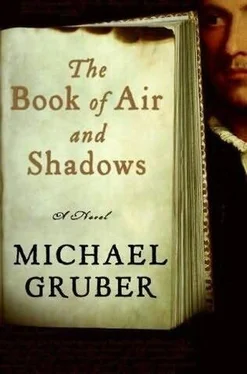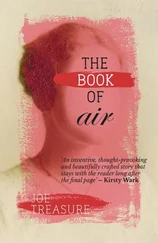At half past noon they broke for lunch. Ever-efficient Mr. Brown had packed the Land Rover with plenty of groceries and Rolly had made soup and sandwiches and more tea, this time with rum in it. They ate in the van to be out of the rain and from this vantage could see Mr. Brown out in the distance, by the road, talking with a man in a Barbour jacket and tweed cap. The man was gesturing with a stick and seemed upset. After a few minutes he returned to his own Land Rover and drove off. Brown walked back across the squelching field to the van.
“That was the National Trust man,” said Brown. “He is much vexed. This field is a registered site and we are absolutely forbidden to disturb it. He’s gone off to fetch the authorities, who will call the water board and find out we are not who we say we are. How close are we?”
“Six point eighty-two,” said Rolly.
“Then we’re going to have to move a little over a meter and get the Item, if it’s there, and clear out in something like half an hour. Break’s over, gentlemen.”
They returned to the well and delved like demons for ten minutes, and here they finally caught a break, because the next layer of rubble consisted of small regular stones the size of cobbles that could be readily flung into the sling. Crosetti was at the bottom when the tape descended past his face and struck the rubble and Rolly called out, “Eight point sixteen.”
He crouched and directed his miner’s lamp at the east wall. At first he saw nothing, only the roughly rectangular stonework of the well shaft. He grabbed a short wrecking bar and pounded on each stone in turn, and on the fifth try one of the stones seemed to move. He forced the straight blade of the bar between that stone and its sister and heaved and the stone slid a little farther out of alignment. In two minutes of violent exertion he had pried it from its place and was looking into a void from which issued an odor of ancient damp earth. His lamp shone on a round shape, about the size of a number ten can.
Hardly breathing now, Crosetti inserted the curved end of the wrecking bar into the hole as far as it would go and wiggled it around until he felt it catch, and slowly pulled out what appeared to be a lead pipe a little over a foot in length and a hand span in diameter, closed at both ends by soldered sheets of lead. Crosetti carried it up the ladder, cradling it tenderly, like a rescued infant.
“That’s it?” asked Rob.
“It shows how much you know, Rob,” said Nigel. “That’s King Arthur’s willie, preserved in brandy. Now England can be great again.”
Crosetti ignored them and went into the van, with Carolyn following close behind. Rob was about to follow but Brown put a hand on his arm. “Time to go, gents,” he said in a tone that did not encourage objection. “I suggest you take down your gear and drive off before the police arrive.”
“We’re not going to get a look?” asked Rob.
“Afraid not. Best you don’t know.” Brown extracted a thick envelope from the inside pocket of his anorak. “A pleasure doing business,” he said, handing it to Nigel. The two geologists went meekly off to gather their equipment.
Inside the van, Crosetti found a heavy clamp, a hammer, and a cold chisel. He fixed the cylinder to the steel table and cut through the lead at one end. Inside he found a roll of heavy paper tied with a dark ribbon. The paper was nearly white and seemed almost fresh, not brown and crumbly as he had imagined four-hundred-year-old paper would be. He realized with something of a shock that the last person to have touched this paper was Richard Bracegirdle and before that, William Shakespeare. He voiced this thought to Carolyn.
“Yes, now you’re one with the great. Open the ribbon, for Christ’s sake!” He untied the knot and spread the sheets on the table. The ink was black, barely oxidized, he saw, and not in Bracegirdle’s hand. The pages were all neatly ruled and written on in three vertical columns, for character name, dialogue, and stage directions: the thrifty Swan of Avon had used both sides of each sheet. Automatically he counted them: twenty-one folio sheets in all. Across the top of the first sheet in letters large enough for even his trifling familiarity with Jacobean secretary hand to read was written The Tragedie of Mary Quene of Scotland.
His hand was shaking as he held the page. What had Fanny called it? The most valuable portable object on the planet. He rolled the pages up again and placed them back in the cylinder with the ribbon, and stuck the lead seal in his slicker pocket. Then he grabbed Rolly in a mighty hug and swung her around and yelled like a maniac and ended by planting a kiss on her mouth.
On the roadagain in the Land Rover, Brown said, “I assume all was satisfactory? That noise you made was the crow of victory and not the sob of defeat?”
“Yeah, all our dreams are fulfilled. I assume you’re going to ditch this car.”
“Yes, just up ahead,” said Brown. “We have a few more vehicles as escort just in case security has been breached.”
They pulled into a lane, and there was the familiar Mercedes, or one just like it, and an anonymous black Ford van with two men in the front seat. Security had apparently not been breached because they drove to Biggin Hill without incident. It was cozy in the van and Crosetti, in the shotgun seat, kept drifting off. He had the lead cylinder on his lap. Brown hadn’t asked about it, or asked to see what was in it, but simply placed them both in the hands of a sweet-faced motherly woman in a blue uniform, Ms. Parr, their handling agent, and departed into his efficient anonymity.
Ms. Parr directed them to the passenger lounge, and after looking Crosetti over, asked if he would like an opportunity to freshen up, to which he responded that he would like a shower and a change of clothes if it could be arranged, and it needless to say could be arranged, as what could not be arranged for the fliers in private jets? And how about two large padded envelopes and some packing tape? These appeared, and Crosetti went into the men’s room with them and his carry-on bag and the most valuable portable object on the planet in its lead casing. Alone in the blue-tiled room, he removed the play and sealed it in one of the envelopes and taped this under the lining of the back of his corduroy sports jacket. This he hung on one of the shower hooks, outside the plastic curtain, then stripped and took a shower, and was amazed at the almost Mississippian quantities of silt that flowed off his body and down the drain. While he showered he considered why he didn’t just leave the damned thing with Carolyn and why he was, in effect, concealing it from her.
Because you don’t trust her, came the answer from Rational Albert. But I love her and she loves me, replied Amorous Al. She said so. But Crosetti realized that part of the woman’s appeal was her utter weirdness, the proven fact that she might do anything. Even at this moment he had no guarantee that when he emerged from this bathroom she might not be gone and that he might never see her again. This thought prompted an acceleration in his toilette. Five minutes later, still damp but neatly dressed in the jacket, black jeans, and a flannel shirt, he emerged into the lounge, holding his carry-on (containing Bracegirdle’s lead pipe) and a padded envelope, which he had stuffed with flyers for tourist spots and sealed with tape. Carolyn was seated in the lounge. She had taken a shower and changed her clothes too, and her damp hair seemed darker than it had been.
He sat down next to her. “One more flight,” he said, “and this adventure is over.”
“I hope so,” she said. “I hate adventure. I want to be in a place where I can get up in the morning and see the same people and do pretty much the same thing every day.”
Читать дальше












